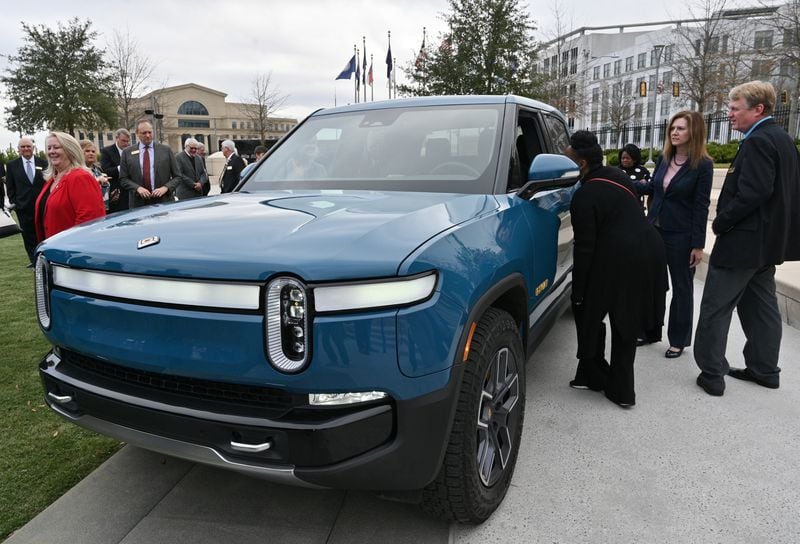Expected Hyundai EV plant in Georgia part of bigger industry wave.
Tesla proved the concept, now the gold rush is on.
Electric vehicles make up about 3% of all vehicles sold in the U.S. They are expected to increase exponentially amid tightening emissions and fuel economy standards, and as the cost of electric vehicles becomes competitive with conventional gas-powered models.
“As far as new manufacturing facilities, (EVs) are where the dollars are being spent,” said David Clayton, executive director of the Clemson University International Center for Automotive Research. Electric vehicles “are performance vehicles and they are luxury vehicles, and people want them. The issue is that the automakers can’t produce them fast enough.”
There is tremendous potential but also lots of competition, economic risk and uncertainty about which companies — and which U.S. states — will emerge as the winners.
Gov. Brian Kemp and his predecessor, Nathan Deal, have tried to position Georgia to be a hub in the electrified future of the auto industry. That includes billions of dollars in subsidies and incentives offered to companies and footed by taxpayers.
Even if Georgia lands the Hyundai Motor EV plant, as expected, and even with Rivian, and an SK Innovation battery factory in Jackson County, the state’s claim as an EV-building capital will have to be proven by the manufacturers as they scale up and develop vehicles consumers want to buy.
Many other states also have big EV footprints already, including California, Nevada and Texas, which Tesla picked for plants.
Guests look at Rivian’s R1T electric truck during a press conference at Liberty Plaza across from the Georgia State Capitol in Atlanta on Thursday, December 16, 2021. Electric vehicle maker Rivian confirmed its plans to build a $5 billion assembly plant and battery factory in Georgia, which Gov. Brian Kemp called “the largest single economic development project ever in this state’s history.” (Hyosub Shin / [email protected])
Credit: HYOSUB SHIN / AJC

Credit: HYOSUB SHIN / AJC
Guests look at Rivian’s R1T electric truck during a press conference at Liberty Plaza across from the Georgia State Capitol in Atlanta on Thursday, December 16, 2021. Electric vehicle maker Rivian confirmed its plans to build a $5 billion assembly plant and battery factory in Georgia, which Gov. Brian Kemp called “the largest single economic development project ever in this state’s history.” (Hyosub Shin / [email protected])
Credit: HYOSUB SHIN / AJC
Credit: HYOSUB SHIN / AJC
Battery charging infrastructure — both on the open road and among utilities to support drivers to plug in at home — also need to be developed in the years ahead at a cost of billions of dollars, some of which is contained in the recent federal bipartisan infrastructure law.
A wobbly economy, inflation, a web of supply chain issues for the auto industry and a looming challenge to source rare Earth minerals to make high-powered EV batteries are among the threats facing automakers —and the states, like Georgia, that are ponying up government funds to support their growth.
Gas-powered models still pay the bills and provide the profits for most automakers, Ketels said, while EVs are an investment that will take years to pay off. But no automaker wants to be left behind.
“It would be silly for me to say all the companies here right now will successfully make that transition,” he said. “It is a delicate dance.”
But consider just some of the announcements that have come in just the past year:
–Ford launched BlueOval City, a multibillion-dollar EV assembly complex in Tennessee, and a network of battery plants in Tennessee and Kentucky with partner SK Innovation. The Detroit automaker also launched its F-150 Lightning pickup to rave reviews and announced plans to expand production.
–General Motors announced plans to invest $7 billion in electric vehicle manufacturing and has launched the GMC Hummer EV and unveiled battery-powered Silverados and Sierras.
–Toyota announced a battery factory in North Carolina and introduced a plug-in crossover developed in tandem with Subaru.
–Volvo, BMW, Mercedes-Benz, Volkswagen and other European giants have committed billions to their battery-powered divisions. Luxury automaker Audi now spends more of its advertising on electrics than for cars powered by conventional engines, according to Bloomberg.
–And not to be outdone, Tesla has opened its “Gigafactory Texas” near Austin. Chief Executive Elon Musk said late last year the plant represents a $10 billion-plus long-term investment.
Georgia makes pricey bets on Rivian, Hyundai
Rivian, a company founded a dozen years ago, went public in November with one of the largest IPOs in U.S. history. Its stock price has returned to earth, much like the rest of the stock market, but the company still plans to build 600,000 vehicles per year at its two plants after its Georgia facility is at maximum capacity.
The company makes its flagship R1T truck and R1S SUV and delivery vans for…
Read More: Expected Hyundai EV plant in Georgia part of bigger industry wave.

